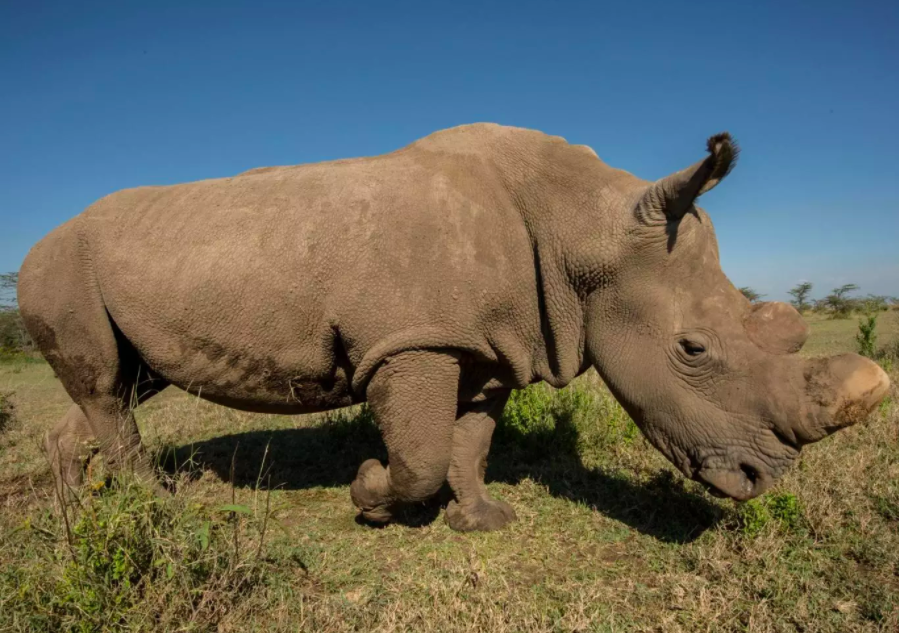Goodbye buddy: Yes, I miss him terribly, says Sudan’s keeper
Round-the-clock carers of last male Northern White Rhino describe his last days and outpouring of global support

Zachary Mutai stares blankly at the empty enclosure that was once home to Sudan at Ol Pejeta Conservancy in Kenya’s Laikipia region. Mutai looks sad as he receives guests who have come to pay tribute to Sudan, the last male Northern White Rhino.
He was head keeper of Northern Whites at the conservancy, and had spent the last eight years with Sudan before his death in March. James Mwendwa, his colleague who has been taking care of Sudan for the past four years, is also lost for words.
The emptiness and sadness at at the conservancy is evident from the forlorn look of most warders. Clearly the wild has lost a giant.
“Waking up to an empty enclosure is heartbreaking,” Mutai says. “Passing next to his pen as I attend the remaining two females is even worse, everything seem so different without Sudan here. We were best of friends for almost eight years since he was brought in from Dvur Králové Zoo in the Czech Republic in December 2009. I miss him terribly.”
When Ol Pejeta Conservancy and the Dvur Králové Zoo announced Sudan’s death, the photo that was released was iconic image of Sudan and Mutai, his buddy and caretaker. In the photo that went viral globally, Mutai is pictured squatting and playfully stroking Sudan by its horn.
“That was the last photo I took with Sudan alive. It was on a Sunday when he miraculously woke up after several days of being unwell. It was after a short period of rain when he woke up and walked to the females’ den. It was his last miraculous visit. He went back to his enclosure minutes later. Then his health deteriorated,” Mutai says.
Sudan was suffering from age-related complications that led to degenerative changes in muscles and bones combined with extensive skin wounds.
The veterinary team from the Dvur Králové Zoo, Ol Pejeta and Kenya Wildlife Service decided to euthanise him, when it was obvious he could no longer wake up.
“His condition worsened significantly in the last 24 hours; he was unable to stand up and was suffering a great deal,” Ol Pejeta said in a press statement.
Just like he won the heart of Mutai, Sudan made friends across the world as his plight became known.
“He was gentle. He was loved by many. He was just like a human being, you talk to him and he responds. Most rhinos are friendly like that. We know when they are not feeling well, when they are happy and when they are just naughty,” Mutai says.
“Because you become so attached to them; when they die, it’s heartbreaking. For the last four years, Sudan became a best friend,” Mr Mwendwa says.
During the last month, Sudan was kept under Intensive Care Unit where he was on 24-hour care by a veterinary officer.
“At some point, he was too sick and looked like he was expressing pain, more so like he was crying and at the verge of giving up. It was distressing to witness these low moments especially when he struggled to wake up,” Mutai recalls.
The situation, he says, was agonising. “During those final days, it was intense. I did not want Sudan to die in my presence. I wanted to hide the emotions and the pressure I was feeling. I knew, in case anything happened to him, there would be so many calls from all over the globe given that he had won so many hearts,” he says.
Though Mutai witnessed the death, he has not taken time off work yet. He is still on hand to answer questions from Sudan’s friends.
“It has been hectic, we receive video calls, emails chats and calls all over the world and everyone wants answers,” he says. “Others come here physically to find closure. It is so sad, it is just like losing a loved one.”
The interesting thing about Sudan’s death is that, like most prophets he was never celebrated at home.
“I realised Sudan was so popular overseas than in Kenya. Whereas Kenyans were wondering who Sudan was, the international community was swift in giving glowing tributes,” Mr Mwendwa says. With the death of Sudan, the global conservation community is hopeful that the In Vitro fertilisation being planned for will save the species from extinction.
In the meantime, Sudan’s candlelight continues to glow.
This article is reproduced here as part of the Giants Club African Conservation Journalism Fellowships, a programme of the charity Space for Giants and supported by the owner of ESI Media, which includes independent.co.uk. It aims to expand the reach of conservation and environmental journalism in Africa, and bring more African voices into the international conservation debate. Read the original story here

Join our commenting forum
Join thought-provoking conversations, follow other Independent readers and see their replies
Comments
Bookmark popover
Removed from bookmarks